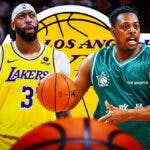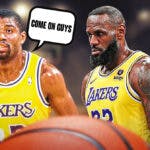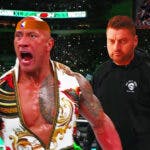The Los Angeles Lakers and Washington Wizards shook up the NBA in the early moments of the 2021 NBA Draft with the summer's first blockbuster. The Lakers sent Kyle Kuzma, Montrezl Harrell, Kentavious Caldwell-Pope, and the No. 22 pick to the Wizards in exchange for the NBA's all-time triple-double leader, Russell Westbrook.
Thank you DC! You welcomed my family and I with open arms from day one. Everyone from the front office, to the training staff, the coaches, my teammates, and the fans. I’m grateful y’all took a chance on me and supported me every step of the way. pic.twitter.com/wTvHQHPIOU
— Russell Westbrook (@russwest44) July 30, 2021
Lakers GM Rob Pelinka is just getting started. Free agency opens on Monday — the Lakers have nine remaining free agents from the 2020-21 roster — and the Westbrook splash did not address (and, in fact, exacerbated) Los Angeles' three-point shooting woes.
The Westbrook trade likely rules out the re-signing of Dennis Schroder, unless Dennis pulls a full-180 and agrees to be the Sixth Man on a bargain. Assuming that doesn't happen, whether (and when) the Lakers let him walk for nothing or find a sign-and-trade partner could influence every ensuing decision.
The Lakers want to retain Alex Caruso and Talen Horton-Tucker, each of whom could fetch $10 million in 2021-22, though it's unclear how the Westbrook addition affects L.A.'s likelihood of doing so. Los Angeles can exceed the cap to retain both, though not without stiff luxury tax penalties (THT is the Klutch client).
As for Westbrook and the Lakers — whew. A lot to digest.
First of all, the blockbuster should not come as a total surprise. Westbrook is a Long Beach native who played at UCLA and owns the unabashed fandom of LeBron James. Buzz had been buzzing.
Stars like to play with proven stars, regardless of Second Spectrum data or online takery. LeBron James and Anthony Davis are always consulted on major moves (ahem, Green Bay Packers) — and there's zero chance a shake-up of this magnitude gets greenlit without their emphatic endorsement. (Update: on Friday, we learned the three stars recently dined together, and Westbrook let the Wizards know he wanted to return home, where his family lives.)

The Lakers will be on the hook for Westbrook's $44M in 2021-22, and his $47M (!) player-option for his 15th season, when he'll be a ripe 34 years old. Ideally, for the Lakers, the hometown kid would forego the option and re-work his deal at a lower annual cost, a la Chris Paul and the Phoenix Suns.
At this moment on the timeline, the Lakers have Russ ($44M), LeBron ($41M), AD ($35M), and Marc Gasol ($2.6M) on the books for next season…and that's it, assuming they pass on Alfonzo McKinnie's $1.9M option. Including Luol Deng's $5M check, the Lakers cap sheet amounts to $127.6M — $15M over the cap and $16M under the tax apron. Because Westbrook is under contract, the trade did not trigger a hard cap. They also have no three-point shooting and are short at least one starter.
The Lakers can use their nontaxpayer midlevel ($5.9M), veteran exception, and minimum deals to fill out the roster — Wesley Matthews, Markieff Morris, Dwight Howard, Jeff Green, Carmelo Anthony, J.J. Redick. They signed four undrafted free agents.
On the court, the Lakers' two stated priorities this offseason were upgrading their perimeter play-making and spacing. Westbrook checks one of those boxes.
There isn't a neat statistical case supporting the Westbrook addition; an ironic thing to say about someone who has averaged a triple-double in four of the past five seasons, including 22.2 points, 11.5 rebounds, and 11.7 assists in 2020-21. However, his 30.5% career three-point percentage is rough.
Brodie's ultimate advantage is his 110% effort when everybody else is going through the motions, and that advantage neutralizes in the postseason. In 111 playoff games, he's averaged nearly four turnovers per game, shot a hair over 40%, and has reached the conference finals twice. It's not that he can't go up a level in the playoffs, it's just that he hasn't.
Oddly, he's shot 70.4% from the foul line over the past four seasons after hitting 82.3% of his free throws for the first nine years of his career.
Westbrook's regular-season value is a guarantee, efficiency stats aside. On a game-to-game basis, he'll produce more than the supporting pieces the Lakers sent to D.C. For Davis and LeBron, having an indefatigable teammate like Westbrook to carry the load — emotionally, physically, and play-making-wise — will pay dividends.
Westbrook will help solve one of the Lakers' biggest weaknesses over the past two years: Non-LeBron minutes. The Lakers have averaged 105.4 points per possession with James off-the-floor since 2019-20, a bottom-5 number.
At the very least, Russ is a super-charged Dennis Schroder — a little worse beyond the arc but more impactful by sheer force of will, even if every defensive slide isn't as on point. He'll grab boards and push the pace like a certain Lakers point guard used to do in the 1980s. That will be useful and energizing beyond measure.
James and Davis reportedly both told Westbrook they're willing to play the two big spots and — that's a step in the right direction. Westbrook also told the stars he doesn't mind playing off-ball, which is a nice sentiment unless you're a deeply unproductive off-ball player.
Westbrook and LeBron when they’re one assist shy of a triple double pic.twitter.com/EJlcEMKybO
— Jimmy (@jimmy_koski) July 30, 2021
Evaluation of this trade will not come in November, or January, or March, and won't be determined by transition alley-oops or triple-doubles. For the Lakers, there is one ring to rule them all, and the regular season is all preparation. We'll learn a lot more about the efficacy of this trade next week … and then again in June.
Like it or not: the stars always end up in Hollywood.




